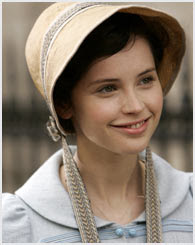 Catherine Morland
Catherine MorlandThe juxtaposition of fiction to reality will provoke her distorted vision of people and facts, her incapacity to judge them properly, her blunders and several misunderstandings.
Catherine, instead, was plain, had a thin awkward figure, a sallow skin without much colour, dark lank hair and strong features; she was noisy and wild, hates confinement and cleanliness, enjoys boys’ pastimes...
Catherine fails to recognize the obvious developing relationship between her brother James and her friend Isabella; she fails to recognize Isabella's true nature until long after it has hurt her brother; she accidentally leads John Thorpe into thinking she loves him; and most significantly, she embarrasses herself in front of Henry Tilney when he finds out she suspects his father of murder. While Catherine is an avid reader of novels, she is inexperienced at reading people, and this is what causes many of the problems she encounters. By the end of the novel, she has become a much better judge of character, having learned from her mistakes with Isabella and General Tilney. She is also, perhaps, a bit more cynical about people, as Henry is. Ultimately, it is her integrity and caring nature that win Henry's heart and bring her happiness.

Would you have ever said that she had an ancient, noble, world-wide famous ancestor from Spain? Do you remember him? He too was an avid reader of tales and he too confused reality and the images in his mind, those heroic images taken from the wonderful romances he had read in great quantitities. YES!
Don Quixote ( 1605 ) is a parody of the romances of Cervantes's time. Don Quixote rides out like any other knight-errant, searching for the same principles and goals and engaging in similar battles. During these battles, he invokes chivalric ideals, regardless of how ridiculous his adventures may be. On another level, however, the adventures of Don Quixote and Sancho Panza in the novel's First Part attempt to describe a code of honour that could serve as an example for a Spain that was confused by war and by its own technological and social successes. Cervantes applies this code of values to a world in which such values are out of date.
Don Quixote is a gaunt, middle-aged gentleman who, having gone mad from reading too many books about chivalrous knights, determines to set off on a great adventure to win honor and glory in the name of his invented ladylove, Dulcinea. Don Quixote longs for a sense of purpose and beauty—two things he believes the world lacks—and hopes to bring order to a tumultuous world by reinstating the chivalric code of the knights-errant. Initially, Don Quixote's good intentions do only harm to those he meets.
 Well, Catherine has also got a fascinating French lady among her descendants. Any idea? Not a clue? Ok. I’ll help you: Emma, better known as MADAME BOVARY (1857).
Well, Catherine has also got a fascinating French lady among her descendants. Any idea? Not a clue? Ok. I’ll help you: Emma, better known as MADAME BOVARY (1857).Like Jane Austen in Northanger Abbey parodies Gothic heroines, in Emma Bovary Flaubert uses irony to criticize romanticism and to investigate the relation of beauty to corruption and of fate to free will. Emma embarks directly down a path to moral and financial ruin over the course of the novel. She is very beautiful, as we can tell by the way several men fall in love with her, but she is morally corrupt and unable to accept and appreciate the realities of her life. Since her girlhood in a convent, she has read romantic novels that feed her discontent with her ordinary life. She dreams of the purest, most impossible forms of love and wealth, ignoring whatever beauty is present in the world around her. Flaubert once said, “Madame Bovary is me,” and many scholars believe that he was referring to a weakness he shared with his character for romance, sentimental flights of fancy, and melancholy. Flaubert, however, approaches romanticism with self-conscious irony, pointing out its flaws even as he is tempted by it. Emma, on the other hand, never recognizes that her desires are unreasonable. She rails emotionally against the society that, from her perspective, makes them impossible for her to achieve.
She starts mixing fiction to reality and to wish her life to be just as it is in the novels she loves reading …She doesn’t go crazy like don Quixote, but, even worse, she dies.
So among the three characters Catherine’s fate is the luckiest and happiest






















 During the 18th century the British Royal Navy had become the best in the world, and island's nation symbol of security and prosperity, and popularly regarded as invincible. Younger sons of the landed gentry seized the opportunities afforded by the revolutionary and Napoleonic Wars to join the Navy in the hope of gaining both honours and prize-money. The official arrangement was that any hostile ship which the Navy captured , together with
During the 18th century the British Royal Navy had become the best in the world, and island's nation symbol of security and prosperity, and popularly regarded as invincible. Younger sons of the landed gentry seized the opportunities afforded by the revolutionary and Napoleonic Wars to join the Navy in the hope of gaining both honours and prize-money. The official arrangement was that any hostile ship which the Navy captured , together with 



.jpg)








